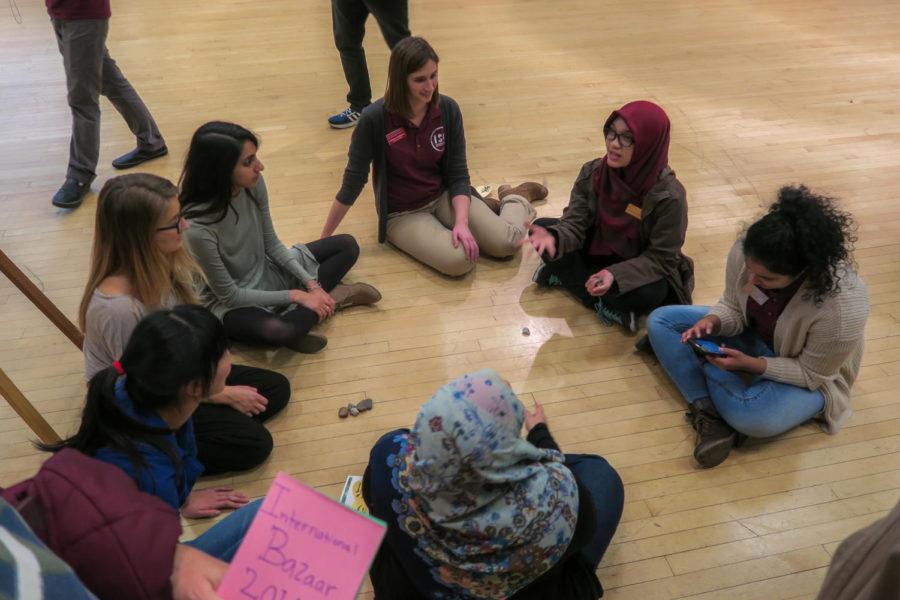International enrollment less than years’ previous, political climate and university ranking behind decline
Students and organizers play a traditional game using rocks at the International Bazaar Night on Nov. 16 in the Memorial Union’s Sun Room.
September 12, 2018
The number of international students enrolled at Iowa State has dropped significantly in the past two years.
From 2013 to 2016, there was a continuous growth of international students. But from 2016 to 2017, international freshmen enrollment in the fall semesters dropped from 334 to 232.
And in the fall of 2018, only 165 international freshmen are enrolled at Iowa State — a more than 50 percent decrease compared to the number of students in 2016.
Martino Harmon, senior vice president for student affairs, said the decrease is a nationwide trend especially in the past two years, and there are multiple reasons behind it including the current political climate.
“Regarding the decrease, much of it has to do with the national political climate,” Harmon said. ”International students are much more cautious about making decisions on where they want to enroll. They may be looking at other countries as options.”
These concerns regarding U.S. immigration policies are keeping some of them from applying to American universities, Harmon said.
“Sometimes it’s not even the actual change in the policies, but the concerns students have is making them anxious about attending our schools,” Harmon said.
Another point Harmon raised is that international students tend to make their school choices based on rankings.
“To look at the top Ivy League schools,” he said, “they tend to be ranked higher. And that’s very important to international students because there is so much competition and that makes it even more challenging.”
And with more competition, the rankings mean more.
“That makes it more challenging for Iowa State to attract students,” Harmon said.
Katharine Johnson Suski, director of admissions, said international students also often worry about their immigration status, even if they already successfully obtained a visa.
“International students have concerns about getting a visa, and when they did, they are worried about not be able to stay in the country or keep their immigration status during their college career,” Suski said. “And eventually, not be able to finish their study and get a degree.”
The decline of international students could have an immense negative impact on the university.
“If the number keeps dropping, there is going less diverse experiences and fewer viewpoints provided by students from other countries,” Suski said. “That’s not what an institution like universities want.”
In terms of rankings, however, Suski said they don’t tell the full story.
“Many international students solely rely on rankings when choosing schools,” Suski said. “We want students to see Ames [as] a welcoming, safe and easy to adjust environment for them, and we wish they can take that into consideration. Plus, ISU has many top-ranked academic programs. The overall rankings don’t paint a whole picture.”
International students also pay a higher tuition rate. Negative impact on university’s finance could occur with the number decline.
Laura Doering, associate vice president for student affairs, said another reason behind the decline is other nation’s aggressive international recruitment.
“Canada is a great example,” Doering said. “They certainly are winning in some of the territories.”
Iowa State is putting more effort in recruiting international students through a program named YIELD. The program is focused on encouraging international students who receive offers to take them and eventually enroll at Iowa State.
“We asked our Chinese and Indian Iowa State alumni to help us spread the message in their countries, and hopefully get more international students to consider us,” Doering said.
Khum Yan Chew is from Malaysia and is a junior in culinary food science. She said she is happy she chose Iowa State.
“I applied [to] several schools, some in America, some in the U.K.,” Chew said. “The culinary food science major in ISU is one of the best out of all the schools I applied, so when I got the offer, I was very excited.”
She said the overall ranking of a university doesn’t mean too much for her.
“When I was making the decision, I did research on Ames, on the environment,” Chew said. “To me, those things are more important, because I will be living here for a couple of years. I want to make sure the lifestyle of a city is fitted for me.”







